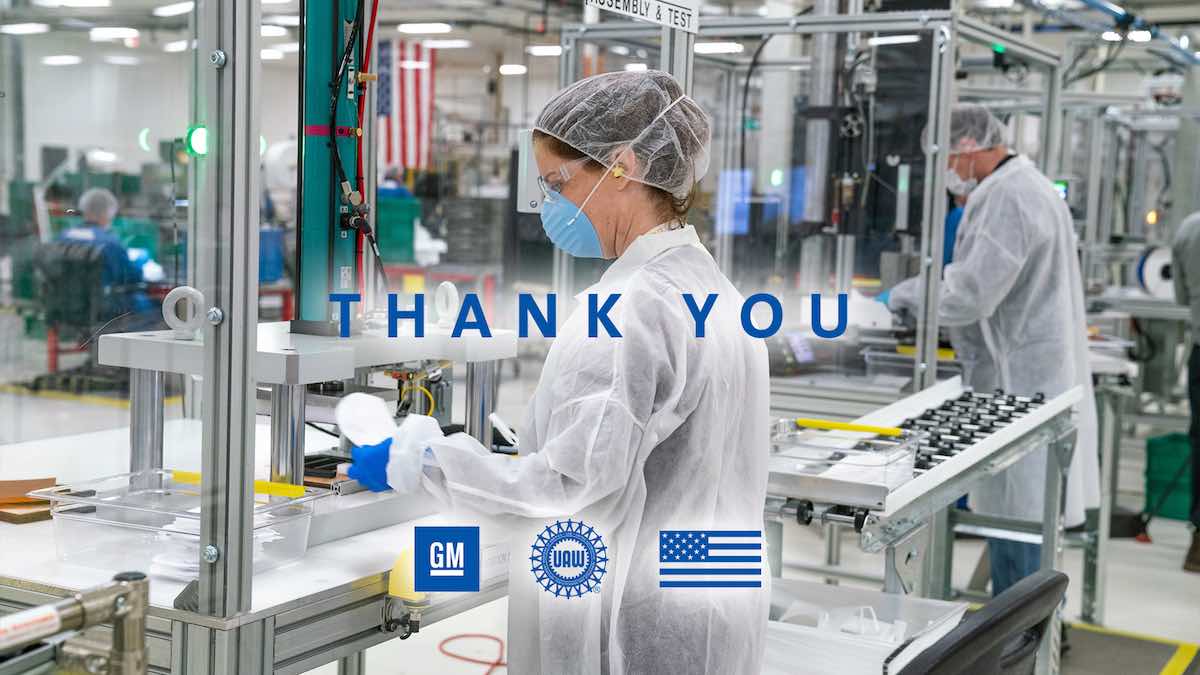| | | | | | | Presented By General Motors | | | | Generate | | By Ben Geman ·Nov 30, 2020 | | Welcome back! Today's Smart Brevity count: 1,231 words, < 5 minutes 🗓️ Join Axios tomorrow at 12:30pm ET for a World AIDS Day and Giving Tuesday virtual event. Register here. 🎸And let's wish happy birthday to the innovative Shuggie Otis, who provides today's intro tune... | | | | | | 1 big thing: Nurturing climate tech to avoid "valleys of death" |  | | | Illustration: Sarah Grillo/Axios | | | | A group aimed at helping startups bring climate-friendly tech to market announced this morning its first funding recipients and partnership with VC firms and corporate giants including Microsoft and BP. Why it matters: Third Derivative, an accelerator from New Energy Nexus and Rocky Mountain Institute unveiled months ago, aims to speed the timeline from lab innovation to real commercial deployment — and avoid problems that thwart many researchers, especially in hardware. Driving the news: Third Derivative divulged a whole bunch of specifics, including news of... 1. Funding commitments from a global network of VC firms, such as U.S.-based Imperative Ventures, China's Tsing Capital, and Factor[e] Ventures, which focuses on Africa and India. 2. A suite of big corporate partners including Microsoft, BP, Wells Fargo, power giant Engie, FedEx, Shell, and AT&T. 3. Nearly 50 startups spanning about a dozen nations and four continents that receiving funding have been unveiled, such as... - Lithium company Summit Nanotech.
- Gricd, which focuses on cold-chain logistics.
- Cooling company M2 Thermal Solutions.
- Iris Light Technologies, which has tech for creating efficient data centers.
- Sustainable packaging company LimeLoop.
- Power electronics company Switched Source.
One level deeper: The goal is to shepherd startups across the various "valleys of death" — meaning the perilous terrain between startup formation and product development or between tech validation and commercial scale. - "The traditional Silicon Valley VC model is not well suited towards hard climate tech. The capex is too high, the development and sales cycles too long, and the markets too complicated," Cyril Yee, co-founder and head of research and investments, said in a press release.
How it works: They aim to be a "global, vertically integrated engine for climate innovation." - The Third Derivative structure provides startups with access to tech and policy experts, VC money, and corporate giants interested in using the startups' tech, helping them build it, or even buying the companies outright.
- They're especially interested in startups creating technologies for sectors where it's difficult to cut emissions, such as steel production and other heavy industry, cooling and more.
The bottom line: Massively cutting emissions in coming decades will require new and evolving technologies for power, fuels, buildings, agriculture and more — even as much wider deployment of existing solutions is vital. |     | | | | | | 2. Breaking: GM's shrinking deal with Nikola |  | | | Illustration: Rebecca Zisser/Axios | | | | General Motors will no longer take an equity stake in Nikola Corp. or build its pickup truck, under a revised deal that still envisions GM as a key tech supplier for Nikola's planned line of electric and fuel cell heavy trucks. Driving the news: The revised agreement Monday is smaller in scope than a draft partnership rolled out in September that had included a $2 billion stake in the startup and an agreement to build its Badger pickup. - Under the nonbinding deal, the companies will work together to use GM's "Hydrotec" fuel-cell technology in Nikola's planned semitrucks.
- In addition, they will "discuss the potential for the utilization of GM's versatile Ultium battery system" in the vehicles, the announcement states.
Why it matters: The deal's future has been uncertain since Nikola was hit with allegations that now-departed founder and executive chairman Trevor Milton had made misleading or inaccurate statements. Where it stands: In addition to dropping plans for the equity stake, the slimmed-down deal no longer involves GM building the pickup, and Nikola said it will refund customer deposits it had taken for the vehicle. - "[T]he Nikola Badger program was dependent on an OEM partnership," the announcement states, signaling that Nikola is not currently planning to proceed with the vehicle.
What they're saying: "The signing of GM as a partner is a positive but ultimately no ownership/equity stake in Nikola and the billions of R&D potentially now off the table is a major negative blow to the Nikola story," Wedbush Securities analyst Dan Ives said in a note. |     | | | | | | 3. OPEC+ faces a big decision | | Oil prices are dipping this morning as it remains unclear what OPEC+ will decide in meetings early this week. Why it matters: Analysts have for weeks been expecting the group to delay plans to ease its joint production curbs at year-end, but several reports suggest things are in flux. - The length of a potential extension is unclear. And failure to delay the upcoming taper at all could send oil prices' fragile recovery of late into reverse as the pandemic is still depressing demand.
Driving the news: "OPEC and its allies headed into a two-day meeting with ministers still seeking a compromise on proposals to delay a production boost, after failing to reach consensus in talks on Sunday night," Bloomberg reports. |     | | | | | | A message from General Motors | | These videos are preparing kids to be future engineers | | |  | | | | Using everyday items, kids can recreate STEM projects in the comfort of their homes. Here's how: Electrifying Engineering, a series of online videos from GM, is helping students learn about electric car motors, autonomous vehicle sensors, electric car charging and more. Get started. | | | | | | 4. Joe Biden's expanding climate orbit |  | | | Illustration: Sarah Grillo/Axios | | | | News emerged last night that President-elect Joe Biden plans to tap Brian Deese to direct the National Economic Council inside the White House. Catch up fast: He was a senior climate aide late in the Obama era, helping to craft the Paris climate deal, and held senior roles at White House Office of Management and Budget and the NEC. - During the Trump years, Deese has been head of sustainable investing at asset management behemoth BlackRock (more on that in a moment).
Why it matters: The NEC could play an influential role steering climate policy in the Biden era, especially as the nascent administration plans a broad approach that goes well beyond agencies like EPA and Interior. - "Brian will be the most focused on climate change of any top economic official ever. He sees it as an integral part of an overall economic strategy," Jason Furman, who led the Council of Economic Advisers under former President Obama, tells me.
- "He is very effective at whatever he sets his mind to, so will help the administrative creatively execute using all of its levers even if it cannot get legislation passed," he says.
Where it stands: Deese's BlackRock gig makes him a controversial figure on the left. Some groups argue that work with BlackRock, which has big fossil fuel holdings, should be disqualifying despite the company's increased focus on climate. - Criticism of BlackRock goes beyond climate change, but that's certainly part of it.
- Last week, for instance, activists with groups including the Sunrise Movement's New York chapter staged a demonstration outside BlackRock offices there.
Yes, but: A bunch of climate advocates, ranging from people with establishment green groups to those allied with the left flank of the movement, have been speaking up on Deese's behalf. - A few days ago the prominent progressive activist Bill McKibben penned a widely circulated Twitter thread defending Deese's commitment.
|     | | | | | | 5. Catch up fast: VW, Repsol, energy data, mining | | EVs: "Volkswagen is bringing forward the development of a small electric car for the mass market in anticipation of tougher climate regulations, according to plans seen by Reuters, as it seeks to boost sales in a new green era." (Reuters) Oil-and-gas: "Spain's integrated Repsol is planning sharp cuts to investment in its core upstream oil and gas business over the next few years, while its budget for low-carbon energy projects is being increased." (Argus Media) Deals: "S&P Global Inc. agreed to acquire IHS Markit Ltd. for about $44 billion, the companies said Monday, a landmark deal that would combine two of the largest providers of data to Wall Street." (WSJ) Alaska: "The U.S. Army Corps of Engineers denied a permit for the controversial Pebble Mine in Alaska on Wednesday, saying the "proposed project is contrary to the public interest," per the New York Times." (Axios) |     | | | | | | 6. Quote of the day | | "I see no more growth until 2022, 2023, and it will be very, very light in regard to the U.S. shale industry ever growing again." Who said it: Pioneer Natural Resources CEO Scott Sheffield, speaking to Bloomberg. Why it matters: It's one insider's view of the lasting effect of the pandemic that sent U.S. oil production sharply downward. |     | | | | | | A message from General Motors | | You answered the call | | |  | | | | When America needed ventilators, masks, and face shields, GM and UAW workers answered the call. You delivered 30K critical care ventilators in just 4 months. You used your skills to help save lives. So from GM, from the UAW, and from your nation: thank you. | | | | | | Axios thanks our partners for supporting our newsletters.
Sponsorship has no influence on editorial content. Axios, 3100 Clarendon Blvd, Suite 1300, Arlington VA 22201 | | | You received this email because you signed up for newsletters from Axios.
Change your preferences or unsubscribe here. | | | Was this email forwarded to you?
Sign up now to get Axios in your inbox. | | | | Follow Axios on social media:    | | | | | |







No comments:
Post a Comment